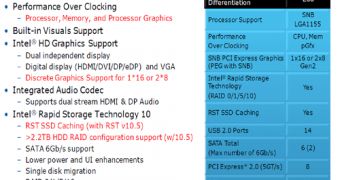It seems like rumors regarding Sandy Bridge processors are now showing up on a daily basis, although this latest one has less to do with Intel's second generation Core processors and more to do with their platforms since we are talking about a future, not yet disclosed chipset, code-named Z68.
As most of you surely know, Intel decided to go with a new socket for the Sandy Bridge processors line, dubbed LGA 1155, the list of chipsets supporting this new socket being pretty short until now, featuring the Intel P67 and H67 offerings.
Both of these are actually pretty similar when it comes down to features, apart from the fact that H67 offerings come with the video path needed in order to take advantage of the processor built-in graphics unit, the P67 lacking support for this.
But moving back to the matter at hand, a recent slide posted online on the Chiphell forum and picked up by SemiAccurate, details what seems to be the Intel Z68 Express chipset.
As taking a quick look at the slide reveals, this new chipset seems to be quite an odd appearance among Intel's line-up since it comes with Intel HD graphics support as well as “Performance Over Clocking” support.
Why would an enthusiast, interested in overclocking would want integrated graphics is beyond me, the Performance Over Clocking claim also striking me as a bit odd since Sandy Bridge processors come with an locked clocked gen that doesn't allow users to change the CPU's base clock, overclocking being possible only by raising the chip's multiplier.
Since this clock gen is built inside the processor, I don't actually see how the Z68 would allow for improved overclocking compared to the P67 or H67, so this is one feature that I am actually quite curious to see how it works, if the Z68 actually makes it to the market that is.
Going through the rest of the slide, it's business as usual for Intel, the only thing that manages to raise my interest being that RST SSD Caching feature that should allow for SSDs to be used as fast cache memories for regular HDDs.
End of it all, I think that all we can do now is wait and see if this actually makes it out into the wild or if it proves to be just another piece of FUD thrown our way.

 14 DAY TRIAL //
14 DAY TRIAL //